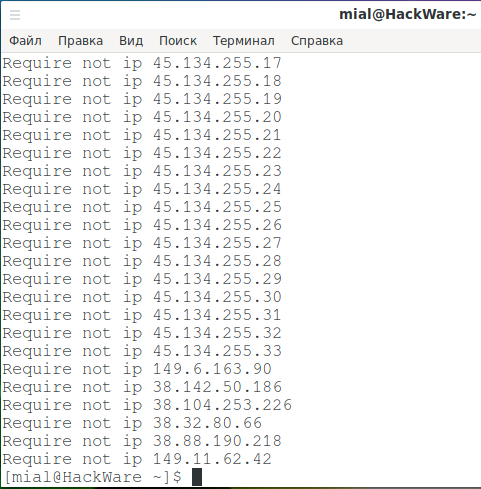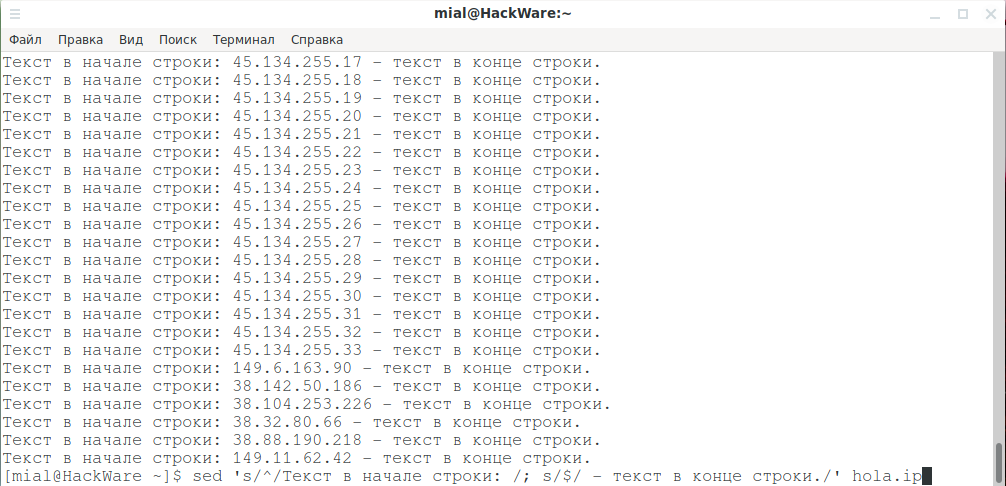- How do I add text to the beginning of a file in Bash?
- 11 Answers 11
- добавить строчку в начало файла
- Re: добавить строчку в начало файла
- Re: добавить строчку в начало файла
- Re: добавить строчку в начало файла
- Re: добавить строчку в начало файла
- Re: добавить строчку в начало файла
- Re: добавить строчку в начало файла
- Re: добавить строчку в начало файла
- Re: добавить строчку в начало файла
- Re: добавить строчку в начало файла
- Как добавить строку в начало или в конец каждой строчки
- Как добавить строку в начало каждой строчки
- Как добавить строку в конец каждой строчки
- Как добавить строку в начало и в конец каждой строчки
- Связанные статьи:
How do I add text to the beginning of a file in Bash?
Hi I want to prepend text to a file. For example I want to add tasks to the beginning of a todo.txt file. I am aware of echo ‘task goes here’ >> todo.txt but that adds the line to the end of the file (not what I want).
11 Answers 11
echo 'task goes here' | cat - todo.txt > temp && mv temp todo.txt sed -i '1s/^/task goes here\n/' todo.txt sed -i '1itask goes here' todo.txt sed -i '.bak' '1s/^/task goes here\'$'\n/g' todo.txt echo -e "task goes here\n$(cat todo.txt)" > todo.txt echo 'task goes here' | cat - todo.txt > temp && mv temp todo.txt the first one works great! would you mind explaining the logic? im not particularly sure how to interpret the syntax.
@user8347: Pipe ( | ) the message ( echo ‘. ‘ ) to cat which uses — (standard input) as the first file and todo.txt as the second. cat conCATenates multiple files. Send the output ( > ) to a file named temp . If there are no errors ( && ) from cat then rename ( mv ) the temp file back to the original file ( todo.txt ).
@itaifrenkel: I’d have to see what you did, but if cat receives a literal backslash n, it won’t convert it to a newline. Something else must have done that. Instead of cat , try piping into hexdump -C to see if you’re actually sending backslash and n or if it’s a newline. You could also try cat -e to show line endings.
@Kira: The 1 means do the next command only on line one of the file and the i command is insert. Look in the man page under the «Addresses» section and in the «Zero- or One- address commands» section.
A simpler option in my opinion is :
echo -e "task goes here\n$(cat todo.txt)" > todo.txt This works because the command inside of $(. ) is executed before todo.txt is overwritten with > todo.txt
While the other answers work fine, I find this much easier to remember because I use echo and cat every day.
EDIT: This solution is a very bad idea if there are any backslashes in todo.txt , because thanks to the -e flag echo will interpret them. Another, far easier way to get newlines into the preface string is.
echo "task goes here $(cat todo.txt)" > todo.txt . simply to use newlines. Sure, it isn’t a one-liner anymore, but realistically it wasn’t a one-liner before, either. If you’re doing this inside a script, and are worried about indenting (e.g. you’re executing this inside a function) there are a few workarounds to make this still fit nicely, including but not limited to:
echo 'task goes here'$'\n'"$(cat todo.txt)" > todo.txt Also, if you care about whether a newline gets added to the end of todo.txt , don’t use these. Well, except the second-to-last one. That doesn’t mess with the end.
printf would be a lot more consistent across platforms and should generally work more smoothly than echo -e
The moreutils have a nice tool called sponge :
echo "task goes here" | cat - todo.txt | sponge todo.txt It’ll «soak up» STDIN and then write to the file, which means you don’t have to worry about temporary files and moving them around.
You can get moreutils with many Linux distros, through apt-get install moreutils , or on OS X using Homebrew, with brew install moreutils .
I would use tee instead of sponge which come by default on most distro echo «task goes here» | cat — todo.txt | tee todo.txt
@stevenpenny Good point. Now I remember why I didn’t suggest it originally. I came back to this answer not noticing that the output file name was the same as the input, which is why you need sponge to buffer it all before writing it back out.
You can use the POSIX tool ex :
You can create a new, temporary file.
echo "new task" > new_todo.txt cat todo.txt >> new_todo.txt rm todo.txt mv new_todo.txt todo.txt You might also use sed or awk . But basically the same thing happens.
Say you’re out of disk space so that new_todo.txt gets written only partially. Your solution appears to lose the original file.
@Keith Someone working on a VM who didn’t expect to need a particularly large virtual drive. Or someone moving a large file. In any case, the real argument against this is directory permissions; if you don’t have permission to create new files in the given directory, the only command that will successfully execute in your script is the rm of the original file.
If the text file is small enough to fit in memory, you don’t have to create a temporary file to replace it with. You can load it all into memory and write it back out to the file.
echo "$(echo 'task goes here' | cat - todo.txt)" > todo.txt It’s impossible to add lines to the beginning of the file without over writing the whole file.
As far as I’m aware, it’s only limited by the amount of memory available. I’ve filled up variables well over 100MB into memory. text=$(cat file) . Be careful to only use text though, because shell variables aren’t binary clean mywiki.wooledge.org/BashFAQ/058
You cannot insert content at the beginning of a file. The only thing you can do is either replace existing content or append bytes after the current end of file.
Any solution to your question then requires a temporary file (or buffer) to be created (on memory or on disk) which will eventually overwrite the original file.
Beware of not losing data by preserving the original file while creating the new one, should the file system happen to be full during the process. eg:
cat <(echo task go there) todo.txt >todo.txt.new && mv todo.txt.new todo.txt Downvoters are welcome to explain their motivation. None of the remaining answers, including the accepted one, do contradict anything in my reply.
This is difficult to parse as the < . >look like brackets, which I assume they are not. A space between the < and the ( might help?
This is not working for me. echo HOME=\»/g/Users/timregan/\» | cat — ‘F:\Program Files\Git\etc\profile’ works but cat
@dumbledad You are overthinking my reply. There is nothing for you to parse in it. A space between the < and the ( would break the syntax. Try cat <(echo HOME=\"/g/Users/timregan/\") 'F:\Program Files\Git\etc\profile'
echo 'task goes here' | cat - todo.txt | tee todo.txt Final answer
I wasn’t too satisfied with the answers as they felt like too much typing. I liked John Alberts his answer but couldn’t stand to type -e . Unfortunately, I accidentally read over John Alberts his echo 2 liner as well (significantly reducing the value of this answer and me 30 minutes playing around, but oh well, it happens).
In any case, I was focused on finding something that meant you only needed to type the filename and text you want to prepend.
Moreover, I was searching for something that looked aesthetically intuitive. With that I mean: the preprend needs to physically show, even if it’d be an illusion it’d have the effect of a mnemonic.
So I tried an approach with herestrings since in the right context they reduce cognitive strain (i.e. typing < 3 times doesn't require too much thinking power).
I created a file test.txt with the word «monkeys» .
You need to manually press enter yourself.
On the second line the > is from the shell itself, you don’t need to type that.
(1) What I couldn’t manage was a one liner. There seems to be no herestring combination in which I could use $() and \n . Which is why you need to press the newline manually yourself.
The command substitution $(cat file) can be replaced by the equivalent but faster $( < file) .
More typing, but I admit a bit less cognitive strain since cat is being typed twice and is more well-known than the trick of the Bash Reference Manual.
добавить строчку в начало файла
есть ли команда в shell , с помощью которой можно было бы добавить в начало файла с уже существующими данными текстовую строку?
Re: добавить строчку в начало файла
Re: добавить строчку в начало файла
Re: добавить строчку в начало файла
echo «String» > newfile
cat oldfile >> newfile
mv newfile oldfile
Re: добавить строчку в начало файла
Re: добавить строчку в начало файла
Re: добавить строчку в начало файла
Что-то юниксвеем тут и не пахнет, сплошные велосипеды. :\\
Re: добавить строчку в начало файла
Re: добавить строчку в начало файла
> Что-то юниксвеем тут и не пахнет, сплошные велосипеды. :\\
sed сам по себе вещь в себе и уже одним фактом своего использования делает любой скрипт юниксвейным =)
Re: добавить строчку в начало файла
>Что-то юниксвеем тут и не пахнет, сплошные велосипеды. :\\
birdie, предложил отличную штуку, главное логичную, как раз-два-три
юниксвай!?
вот если бы на моно, то да, велосипед.
Как добавить строку в начало или в конец каждой строчки
Рассмотрим варианты, когда в командной строке Linux для всех строчек в файле нужно добавить строку в начало, в конец или сразу в начало и конец.
К примеру, нужно добавить в файл .htaccess тысячи IP адресов для блокировки, которые содержатся в текстовом файле, для этого перед ними нужно добавить строку «Require not ip » или «Deny from » (в зависимости от версии сервера, подробнее смотрите «Контроль доступа к сайту (блокировка по IP, User-Agent)»).
Предположим, наш список IP адресов для блокировки содержится в файле hola.ip:

Чтобы добавить перед каждой строкой «Require not ip » достаточно выполнить команду:
sed 's/^/Require not ip /' hola.ip

Это только один из многочисленных примеров, когда на практике может понадобиться добавлять строки до или после текста.
- ПРЕФИКС — означает текст, вставляемый перед каждой строчкой
- СУФФИКС — означает текст, вставляемый в конце каждой строчки
ФАЙЛ.txt — файл, из которого будут считываться строки для изменения
Как обычно в Linux, любое действие можно выполнить множеством способов даже с помощью одной команды, поэтому для каждого случая будет показано несколько способов.
Обратите внимание, что начальный файл меняться не будет, а новые значения строк будут выведены в стандартный вывод. Если к любой из последующих команд с sed и perl добавить опцию -i, то изменения будут сделаны в исходном файле вместо вывода результатов в стандартный вывод. Например:
sed -i 's/^/ПРЕФИКС/' hola.ip.bac awk -i '< print "ПРЕФИКС" $0 >' hola.ip.bac
Как добавить строку в начало каждой строчки
С помощью sed (любая из команд):
sed 's/^/ПРЕФИКС/' ФАЙЛ.txt sed -e 's/^\(.*\)$/ПРЕФИКС\1/' ФАЙЛ.txt sed 's/.*/ПРЕФИКС&/' ФАЙЛ.txt
С помощью awk:
С помощью perl (любая из команд):
perl -lne 'print "ПРЕФИКС$_"' ФАЙЛ.txt perl -pe 's/^/ПРЕФИКС/' ФАЙЛ.txt perl -lpe '$_="ПРЕФИКС$_"' ФАЙЛ.txt
Как добавить строку в конец каждой строчки
С помощью sed (любая из команд):
sed 's/$/СУФФИКС/' ФАЙЛ.txt sed -e 's/^\(.*\)$/\1СУФФИКС/' ФАЙЛ.txt sed 's/.*/&СУФФИКС/' ФАЙЛ.txt
С помощью awk:
С помощью perl (любая из команд):
perl -lne 'print "$_СУФФИКС"' ФАЙЛ.txt perl -pe 's/$/СУФФИКС/' ФАЙЛ.txt perl -lpe '$_="$_СУФФИКС"' ФАЙЛ.txt
Как добавить строку в начало и в конец каждой строчки

С помощью sed (любая из команд):
sed 's/^/ПРЕФИКС/; s/$/СУФФИКС/' ФАЙЛ.txt sed -e 's/^\(.*\)$/ПРЕФИКС\1СУФФИКС/' ФАЙЛ.txt sed 's/.*/ПРЕФИКС&СУФФИКС/' ФАЙЛ.txt
С помощью awk:
С помощью perl (любая из команд):
perl -lne 'print "ПРЕФИКС$_СУФФИКС"' ФАЙЛ.txt perl -pe 's/^/ПРЕФИКС/; s/$/СУФФИКС/' ФАЙЛ.txt perl -lpe '$_="ПРЕФИКС$_СУФФИКС"' ФАЙЛ.txt



